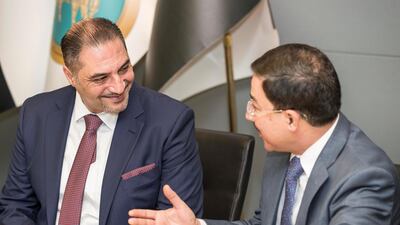Iraq, Opec’s second-biggest oil producers, plans to tap the international debt market with a US$2 billion sovereign bond in the second half of 2018 as it looks to rebuild the war-torn country after years of political instability and sectarian strife, according to its central bank governor.
"It will be 2018, but first of all, we have to get the approval of [the] budget and then ministry of finance, they [will] have to plan for that [bond issuance]…. [it[ might be in the second half," Ali Al Alaq told The National in Abu Dhabi.
The country, which has the world’s fifth-biggest oil reserves globally, had last raised $1bn through an unsupported bond in August, its second foray into the international markets this year. It raised a similar amount through a US-backed bond sold at 2.149 per cent in January 2017.
Iraq for years has battled against ISIL and its sovereign offering in August came on the heels of the country declaring victory in the battle for Mosul against the militant group, which once controlled large swathes of land in country.
The draft document of the Iraq’s 2018 budget specifies the target of a $2bn bond, Mr Al Alaq noted, without saying whether it will be raised through one deal or split over several transactions.
“It will be easy to get that [amount] because we tried that in 2017 and we attracted so many investors and there was big demand on those bonds,” he said, adding that Iraq will be mindful about how much it will raise. “You have to be careful with that."
Iraq, which is implementing a sizeable fiscal adjustment programme and running an austerity campaign, has prepared its 2018 budget on $43 to $46 barrels per day base oil price, far lower than around $60 a barrel mark where crude has traded at for the past few weeks.
“If you look at the draft of the budget for 2018, the [oil] price that we have proposed is between $43 to $46 [per barrel], despite [the current] price being more than that. That will help us to put a ceiling on our expenditure and keep increasing our domestic revenues,” Mr Al Alaq said, adding that higher crude prices mean the country will be able to more conveniently pay off its debts. “It will also give us the room for [servicing] our public debt. This is very important and we would like to give it a priority.”
Explaining the variance between $43 and $46 per barrel base oil price for the next year’s budget, he said Iraq had worked with $43 figure, although the IMF suggested that the budget could be built at a $48 a barrel price assumption, hence the government has now chosen the in-between figure of $46 a barrel.
Iraq, working with the IMF through a three-year standby agreement, is implementing measures to control inefficient expenditures while protecting its social spending. Fiscal consolidation was achieved but at a slower pace and to move the programme forward authorities plans to implement further fiscal measures in 2018 to ensure external and debt sustainability.
______________
Read more:
Iraq returns to debt market with $1bn offering
Iraq pushes ahead with power reconstruction efforts
______________
Mr Al Alaq, however, said that fiscal reform so far is “going well”.
They [the IMF] is comfortable with that. We are very close to their targets. Most of the criteria they have listed we have met so far."
The country, which still relies heavily on the sale of hydrocarbons for revenues, is now seeing signs of improvement in its non-oil economy.
“We have to enhance the real [GDP] sectors. It was very hard to do that as it was difficult time with the war [on ISIL]. Now we can see some signs of serious projects, serious investors and serious investments coming to the country,” he said. “That’s a positive sign for the near future.”
Iraq, which had 65 banks operating in the country as of January 2017, is also looking to restructure some of the government-controlled lenders as part of its efforts to strengthen the financial sector.
There are seven state-owned banks in the country, which dominate market share and account for the bulk of assets and credits. The financial positions of two - Rasheed Bank and Rafidain Bank - are fragile following years of quasi-fiscal operations, according to an August IMF statement on Article 1V consultations with Iraq.
Mr Al Alaq, who heads the committee that is overseeing the restructuring, said the government is now pushing to speed up the process.
“We just had a meeting a few days ago. Everybody was waiting for the financial statements to come from the international firm [appointed to audit the banks] and without that you can’t plan anything,” he said adding that there are still a “few items to be fixed in the financial statements” of these banks.
“That’s what we are trying to do right now: separate those bad accounts. There are also operational issues to be resolved to improve the performance of the banks,” he added.
“After cleaning up the balance sheets, it’s open. There are a few options that we will go with. Those options include everything,” he said when asked if the lenders will be merged or opened up to foreign investors.


